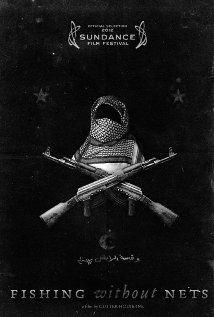Plot
Fishing Without Nets is a story of Somali pirates told from the perspective of a young fisherman named Abdi. The film begins with showcasing Abdi's life as a poor fisherman and his dire family situation. The sea later is revealed to be polluted which makes Abdi's life even more difficult to maintain. The film then transitions into Abdi and his crew hijacking a cargo ship and taking its crew members as hostages. However, Abdi starts to question his actions and develops a bond with one of the hostages, a white man named Victor.
As the story progresses, tensions among the pirates begin to rise. Some of the pirates become frustrated with the lack of payment and the presence of planes flying over their camp. This leads to a confrontation with Khadir and his men on the cargo ship. One of the pirates even threatens to shoot Victor if he doesn't call for money.
Abdi plans to leave the camp to save his family, but he is accused of stealing money and communicating with the drones. The situation becomes more intense when the pirates get high on khat and gasoline and force Victor to recite the shahada. Luckily, Kadir and his men intervene and prevent any harm from coming to Victor.
However, the tension among the pirates continues to escalate, leading to a violent attack and the pirates taking control of the cargo ship. Kadir loses his life, and Abdi is locked in a room at the bottom of the ship after trying to escape. The pirates assume that they are not getting paid and plan to kill the hostages. Victor and Abdi attempt to escape, but Victor is killed by the same pirate who killed Kadir.
Abdi manages to escape and honor Victor with a proper burial. He then sets out to find the money, and after navigating the cargo ship to the area, he finds it. The movie ends with Abdi successfully finding the money and the story coming full circle.
Critical response
Fishing Without Nets met with positive response from critics upon its premiere at the 2014 Sundance Film Festival. Dennis Harvey, in his review for Variety , praised the film that "Cutter Hodierne makes an accomplished feature debut with this very well-crafted, empathetic hijacking drama." [7] John DeFore of The Hollywood Reporter in his review said that "While the setup and the moral dilemmas are all familiar from crime stories told in other settings, Hodierne does a fine job balancing the elements. The movie never reaches the sweating-bullets heights of its Hollywood cousin, but it's distinct enough from that film to keep us watching." [8] Ryland Aldrich from TwitchFilm praised the direction and editing that "From the gorgeous visuals to the incredible acting by non-professionals, Fishing Without Nets takes a world to which we've been recently introduced, and expands it to magnificent results." [9]
This page is based on this
Wikipedia article Text is available under the
CC BY-SA 4.0 license; additional terms may apply.
Images, videos and audio are available under their respective licenses.
